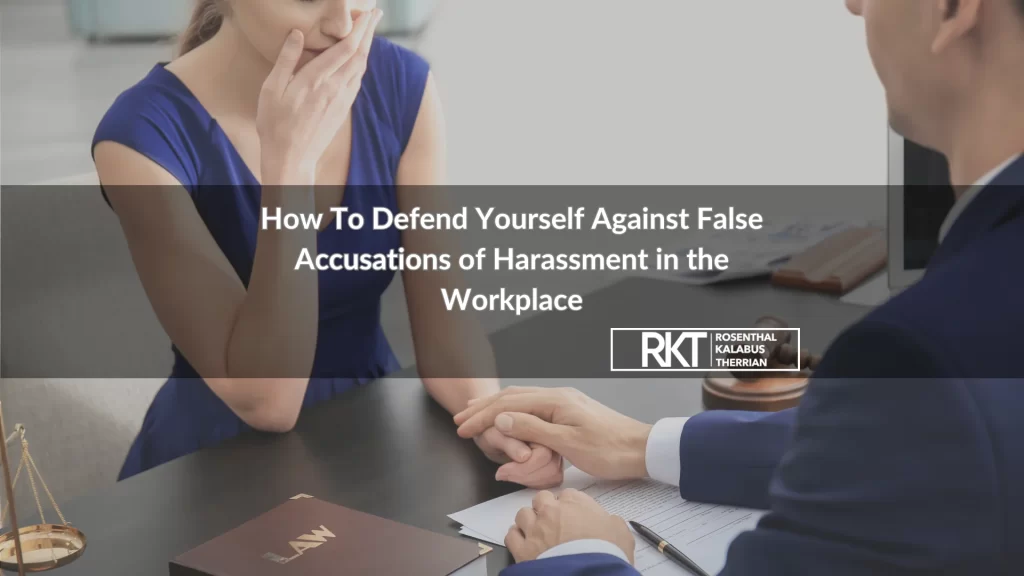
False accusations can derail an individual’s life and may even lead to criminal proceedings. Therefore, if you have been falsely accused, you should defend yourself against any false accusations of harassment in the workplace. Start by contacting an experienced attorney immediately to get started on your defense.
What Constitutes Harassment in the Workplace?
Workplace harassment is any unwelcome or discriminatory conduct that occurs during work. Under federal law, workplace harassment is broken down into two categories:
Quid pro quo: This is sexual harassment that usually occurs when a supervisor requests a sexual favor in exchange for a job-related benefit. Those include promotions or increased pay. To be considered quid pro quo sexual harassment, the accuser must show that:
- There were unwelcome sexual advances, comments, etc.
- That the sexual advances came from a direct or indirect supervisor, and
- The employee’s rejection of the supervisor’s sexual advances would result in a negative employment action.
Suppose the employee declines the supervisor’s advances and the supervisor does not follow through on the negative employment action. In that case, they likely do not have a claim for quid pro quo sexual harassment but may have a claim for a hostile work environment.
Hostile work harassment: A hostile work environment results from inappropriate workplace behavior that creates an abusive work environment for at least one employee. A hostile work environment may result from harassment based on the following:
- Race
- Ethnicity
- Religion
- Disability
- National origin
- Gender
- Sex
- Marital status, or
- Other protected characteristics
What Should I Do Once I Am Falsely Accused of Harassment?
For the best possible outcome, once you are falsely accused of harassment in the workplace, you should:
Document your actions: Once you have been falsely accused of harassment in the workplace, you should start documenting any interactions with the accuser. If the accuser is unknown, all your interactions with co-workers. These can be previous interactions you recall or interactions as they occur. Doing this will help prove that your actions were professional and do not constitute harassment.
Comply with your company’s internal process: If you are accused of harassment, refusing to comply with company policies will make you look guilty. You should contact an attorney and comply with your company’s human resource procedures. While complying with company policies, document all interactions and conversations to show that you acted professionally and complied with the internal investigation.
Gather evidence: After you are falsely accused of workplace harassment, it is important to start gathering evidence showing that you acted professionally. For example, if you had email, phone, or text conversations with the person accusing you, organizing and logging those conversations can help prove your innocence. Additionally, if someone posts on social media about the accusations, log the posts by taking screenshots. Keeping records of all communication and evidence concerning the accusation can make or break your case.
Find your own witness: If there are witnesses to the incident that is being labeled harassment, having them testify to what occurred can also help prove your innocence.
What Not to Do When Someone Makes False Accusations Against You
To put yourself in the best possible position concerning the charge against you, there are some things you should not do:
Destroy any evidence: You should not destroy any evidence related to the accusation because that will make you look guilty of the harassment.
Contact the victim or witness: If you must continue to work with the individual who has accused you of harassment, it is important to document all conversations and keep them completely professional. Discussing the accusation with the accuser or a witness can make it look like you are trying to persuade them to change their story, making you look guilty.
Can I Sue for Being Falsely Accused?
Depending on the consequences of the false accusation of harassment, you may be able to sue the accuser for defamation. Defamation occurs when a third party’s false statements harm someone’s reputation. For example, if someone loses their job because another person negligently accused them of sexual harassment, they may have a defamation case.
How a Lawyer Can Assist with Appeals or Post-Conviction Relief after a Workplace Harassment Verdict
 If you’re found responsible for workplace harassment in Texas, you need and deserve support from a knowledgeable defense lawyer. One of the key ways an experienced attorney can help in such scenarios is to handle potential appeals or post-conviction relief proceedings on your behalf,
If you’re found responsible for workplace harassment in Texas, you need and deserve support from a knowledgeable defense lawyer. One of the key ways an experienced attorney can help in such scenarios is to handle potential appeals or post-conviction relief proceedings on your behalf,
Understanding Appeals in Harassment Cases
An appeal isn’t about re-trying your case but reviewing the legal decisions made during your trial. If your attorney believes there were errors in how the court handled your case, there might be grounds for an appeal. Examples could include inadmissible evidence being used against you or significant procedural mistakes that affected your trial’s outcome. A knowledgeable defense lawyer can review your trial records and identify any potential points of contention to present in an appellate court.
Seeking Post-Conviction Relief
Separate from appeals, post-conviction relief is another avenue to challenge the verdict against you. This might be possible if new evidence emerged that wasn’t available during the original trial or if there were prior issues like ineffective assistance of counsel. Post-conviction relief can reduce penalties or even a vacated verdict in certain cases.
Why You Need Legal Support
The nuances of the appeals process and post-conviction relief proceedings in workplace harassment cases necessitate comprehensive knowledge of legal procedures, case law, and compelling arguments. A skilled lawyer can pursue every possible avenue for relief on your behalf. Given the specifics of your situation, they can also guide you on the best strategies to adopt for your appeal.
Contact an Experienced Attorney
If you need to defend yourself against false accusations of harassment in the workplace, hire an experienced Collin County defense attorney from Rosenthal Kalabus & Therrian. We believe in zealously advocating for our Texan clients to protect their rights and work toward the best possible result in their situation. We want to do the same for you.
Call us today at (972) 369-0577 or contact us online for a consultation and to learn more about your legal options.